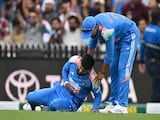When policy decisions get challenged in courts, as is the case with the present government's act of demonetising high denomination notes, it is customary for the government to demand that the judiciary stays within its limits.
Observing Constitution Day on Saturday, Attorney General Mukul Rohatgi said that the judiciary must recognise and respect that there is a "lakshman rekha" that ought not to be crossed. The comment has come in the back drop of the ongoing stand-off between the Supreme Court and the government over judges' appointments. With the Supreme Court agreeing to hear the petitions challenging the validity of the demonestiation policy, the judiciary-government tussle is likely to further escalate. The final judicial outcome will have far-reaching consequences, not just for the balance of powers between the organs of the state, but for the future of constitutional democracy itself.
Besides various procedural and substantive legal issues, basic human rights and the spirit of human liberty are at stake.
It is important to remember that Naseer's Egypt, Sukarno's Indonesia and Stalin's Russia were all self-styled democracies. What distinguishes India from them is that we are not a democracy, simpliciter. We are a constitutional democracy.
Totalitarian states subordinate the rule of law and civil rights to the authority of state-building. Liberal constitutional democracies, on the other hand, place well-defined limits on state powers. In our constitution, the powers of the legislature and executive have been defined, to quote Alexander Hamilton, "that those limits may not be mistaken or forgotten, the constitution is written."
Since the day it was sworn-in, the present government has been pushing those limits. With the demonetization move, the government may have just crossed the "lakshman rekha."
On Thursday, former Prime Minister Manmohan Singh called demonetisation process an "organized loot" and "legalized plunder." Dr. Singh could also have quoted a few Supreme Court judgments which struck down his government's two key policy decisions (2G spectrum and coal block allocations) as unconstitutional and void.
The boot is on the other foot now.
If the 2G spectrum and coal block cases involved "notional losses" due to illegal and malafide allocation of natural resources, it may be argued that the present case has also caused loss of lakhs of crores. Who will be the net beneficiary is the big question.
When a state policy or its implementation is challenged as being contrary to larger public good or violative of constitutional principles, it becomes the duty of court (to quote Justice GS Singhvi from the famous 2G spectrum verdict) "to exercise its powers in larger public interest and ensure that the institutional integrity is not compromised by those in whom the people have reposed trust and who have taken an oath to discharge duties in accordance with the Constitution and the law without fear or favour, affection or ill will."
In the days to come, several profound constitutional and legal issues will have to be judicially examined and settled.
It is a well-settled principle that the state is bound to act in conformity with the principles of equality, public trust and larger public good. Constitutionalism must be reflected at every state of the decision-making process.
The question is whether the present government (while outlawing notes of higher denomination) followed a fair and transparent method consistent with the fundamentals of the equality clause enshrined in the constitution. Whether the exercise suffers from the vice of arbitrariness and malafides. Is it contrary to public interest? Is it discriminatory? Does it favour a few while disadvantaging the rest? Is the government in breach of individual rights? Have the rights to life and liberty, to equality and equal protection of laws, the right to carry on any occupation, trade or business, been violated by the government's sudden move to scarp high currency notes? Can the government deprive a person of property through an executive order and without the authority of law? Whether principles of natural justice, a universal rule of administrative law, have been violated. Is it unconstitutional and void and hence liable to be quashed?
For the moment, in the affidavit filed in the Supreme Court, the government has answered none of these questions. It has defended the move purely on the ground of good intent. Elimination of counterfeit currency, terrorism and black money "operating since Independence" have been cited as government's avowed goals.
As they say, the road to hell is paved with good intentions.
However laudable the objectives may be, the decision will have to meet the test of legally permissible and constitutional limits. Unsuspecting citizens cannot be subjected to collateral damage in the government's "war on black money and corruption." More so, when the government had a whole array of policy options to curb the shadow economy. The onus is on the government to justify why it opted for the most afflictive and draconian option.
"Liberty is power cut into pieces," said Thomas Hobbes. Our constitution safeguards civil rights and civil liberties by both dividing powers (horizontally between three branches of government, and vertically between the centre and states) and adopting fundamental rights.
Has the act of demonetization violated federal principles and fundamental rights? It has grievously affected people's livelihoods and basic liberties. Many people have committed suicide, some have died of shock, some have succumbed because they couldn't buy medical care with the old currency. A large number of people have been deprived of their daily incomes. Worse, the "inconveniences" are unevenly distributed. The poor and lower middle class have been most severely affected, while the affluent sections, with access to plastic money and deep pockets, are better off. The policy also seems to be detached from the socio-economic realities of rural and semi-urban India. Agriculture sector, micro, small and medium enterprises and rural economy have been badly hit. Marriages and private ceremonies have got derailed. Not a day goes by without a tragic story of personal grief being reported in the media.
On the other hand, state government revenues earned from sales tax, stamp duty and excise are expected to take a major hit. Which would mean major cuts in socio-economic welfare programmes and public spending on sectors like health, education, sanitation, drinking water, nutrition and public infrastructure.
Though currency, coinage and legal tender is a union subject, the rights and interests of state governments have inarguably been injured. Whether those who have suffered injury, be it state governments, corporations or individuals, are entitled to damages?
The central government's revenues are also expected to see a slump. Dr. Singh has forecasted a decline of 2 percent in national income. Other forecasts are much gloomier. At the end of the day, some black money might get flushed out, but at what cost?
(Ashish Khetan is a member of AAP and vice chairperson of the Dialogue and Development Commission of Delhi.)
Disclaimer: The opinions expressed within this article are the personal opinions of the author. The facts and opinions appearing in the article do not reflect the views of NDTV and NDTV does not assume any responsibility or liability for the same.
This Article is From Nov 28, 2016
Notes Ban Has Violated Basic Constitutional Rights
Advertisement
Ashish Khetan
- Blog,
-
Updated:Nov 28, 2016 12:08 pm IST
Topics mentioned in this article















